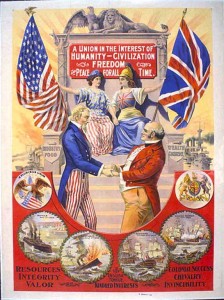Saturday
May292010
Gaza Latest: Israel Prepares Confrontation with "Freedom Flotilla"
 Saturday, May 29, 2010 at 7:45
Saturday, May 29, 2010 at 7:45  On Saturday, seven ships from a "Freedom Flotilla", bringing aid, will try and reach Gaza. It will be met by at least 12 Israeli naval boats, helicopters, and a "counter-flotilla".
On Saturday, seven ships from a "Freedom Flotilla", bringing aid, will try and reach Gaza. It will be met by at least 12 Israeli naval boats, helicopters, and a "counter-flotilla".On Friday, Israeli Foreign Minister Avigdor Lieberman denounced the flotilla:
The aid convoy is violent propaganda against Israel, and Israel will not allow its sovereignty to be threatened in any way, in any place - land, air or sea.
There is no humanitarian crisis in the Gaza Strip. Despite Hamas' war crimes against Israeli citizens and the thousands of rockets fired at Israeli towns, Israel continues to respond in the most humane way possible.
Israel: “The Ideal State: A Dream-Country Without Criticism” (Levy)
Israeli gunships were ordered to take position to stop the convoy, and West Jerusalem made clear that it would overtake the ships as soon as they enter a 20-mile Israeli-controlled zone off Gaza. If the ships do not stop, Israel will attempt to connect the flotilla to naval boats and tow them to the Israeli port of Ashdod where the Israelis have prepared a detention centre. Those who do not want to take a flight back home will be taken to jail.
On Friday, Greta Berlin, one of the organizers of the effort, said a total of seven ships were headed to Gaza after an eighth vessel suffered a malfunction and had to turn back. Halting during darkness, they are expected to reach Israeli waters on Saturday.
The Israel Defense Forces responded that they will not hesitate to use limited force. The Turkish daily Hurriyet reports that the IDF will use a special technology to blackout media coverage in case of an operation.
Israeli Defense Minister Ehud Barak and Foreign Ministry Director General Yossi Gal held a round of explanatory calls with foreign ministers from countries whose citizens are participating in the flotilla. The Israeli message is that the activists are welcome to bring the humanitarian aid to the port of Ashdod, where it will be examined and, if found suitable, will be permitted to enter the Gaza Strip through land crossings. If the activists try to break the siege, they will be arrested.
The spokesman of the Humanitarian Relief Foundation, Umit Sonmez, said that the organisation does not trust Israeli officials who took the members of an earlier convoy into custody for 21 days for no reason. The HRF had written to Israeli officials regarding the planned journey to Gaza but had not received any reply.
Amos Harel and Avi Issacharoff, writing in Haaretz, assess:
The flotilla is not expected to alter in any substantial way the humanitarian situation in the Gaza Strip. It is mostly a battle of public relations that is meant to strike a blow at Israel. Perhaps if Israel was less eager to confront the activists, some of the media attention would have dissipated. Had the flotilla been allowed in, Hamas would have its day, and the entire affair would evaporate quickly.
Haaretz's editors urged the Israeli Government to resume indirect talks with Hamas, to be more flexible about releasing prisoners and to lift the siege on Gaza. They argue that blockade, siege, and military operations, with the hope that Gazans would topple Hamas, has failed: "The suffering that Israel is causing 1.5 million people for this purpose is not only inhuman, but extremely detrimental to Israel's status around the world".
The editors warn, "Even if Israel manages to prevent the flotilla from reaching Gaza, it will still have to contend with other demonstrations of support."
tagged  Amos Harel,
Amos Harel,  Ashdod,
Ashdod,  Avi Issacharoff,
Avi Issacharoff,  Avigdor Lieberman,
Avigdor Lieberman,  Cyprus,
Cyprus,  Egypt,
Egypt,  Ehud Barak,
Ehud Barak,  Freedom Flotilla,
Freedom Flotilla,  Gaza Strip,
Gaza Strip,  Gilad Shalit,
Gilad Shalit,  Greece,
Greece,  Greta Berlin,
Greta Berlin,  Ha'aretz,
Ha'aretz,  Hamas,
Hamas,  Humanitarian Relief Foundation,
Humanitarian Relief Foundation,  Hurriyet,
Hurriyet,  Israel,
Israel,  Israel Radio,
Israel Radio,  Israeli Air Forces,
Israeli Air Forces,  Israeli Defense Forces,
Israeli Defense Forces,  Turkey,
Turkey,  Umit Sonmez,
Umit Sonmez,  Yossi Gal in
Yossi Gal in  Middle East & Iran
Middle East & Iran
 Amos Harel,
Amos Harel,  Ashdod,
Ashdod,  Avi Issacharoff,
Avi Issacharoff,  Avigdor Lieberman,
Avigdor Lieberman,  Cyprus,
Cyprus,  Egypt,
Egypt,  Ehud Barak,
Ehud Barak,  Freedom Flotilla,
Freedom Flotilla,  Gaza Strip,
Gaza Strip,  Gilad Shalit,
Gilad Shalit,  Greece,
Greece,  Greta Berlin,
Greta Berlin,  Ha'aretz,
Ha'aretz,  Hamas,
Hamas,  Humanitarian Relief Foundation,
Humanitarian Relief Foundation,  Hurriyet,
Hurriyet,  Israel,
Israel,  Israel Radio,
Israel Radio,  Israeli Air Forces,
Israeli Air Forces,  Israeli Defense Forces,
Israeli Defense Forces,  Turkey,
Turkey,  Umit Sonmez,
Umit Sonmez,  Yossi Gal in
Yossi Gal in  Middle East & Iran
Middle East & Iran 



